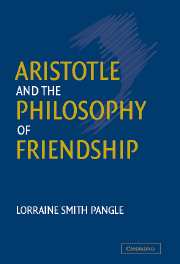Book contents
- Frontmatter
- Contents
- Acknowledgments
- Introduction
- 1 The Challenge of Plato's Lysis
- 2 The Three Kinds of Friendship
- 3 Aristotle and Montaigne on Friendship as the Greatest Good
- 4 Friendships in Politics and the Family
- 5 Cicero's Laelius: Political Friendship at Its Best
- 6 Quarrels, Conflicting Claims, and Dissolutions
- 7 Friends as Other Selves
- 8 Goodwill, Concord, and the Love of Benefactors
- 9 Self-Love and Noble Sacrifice
- 10 Friendship in the Happy Life
- Notes
- Bibliography of Modern Works and Editions
- Index of Names
4 - Friendships in Politics and the Family
Published online by Cambridge University Press: 04 July 2009
- Frontmatter
- Contents
- Acknowledgments
- Introduction
- 1 The Challenge of Plato's Lysis
- 2 The Three Kinds of Friendship
- 3 Aristotle and Montaigne on Friendship as the Greatest Good
- 4 Friendships in Politics and the Family
- 5 Cicero's Laelius: Political Friendship at Its Best
- 6 Quarrels, Conflicting Claims, and Dissolutions
- 7 Friends as Other Selves
- 8 Goodwill, Concord, and the Love of Benefactors
- 9 Self-Love and Noble Sacrifice
- 10 Friendship in the Happy Life
- Notes
- Bibliography of Modern Works and Editions
- Index of Names
Summary
In opening his thematic discussion of the relationship of justice to friendship, Aristotle says, “It seems, then, just as we said at the beginning, that friendship and the just deal with the same things and involve the same persons” (1159b25–26). In fact, what Aristotle said at the beginning of his treatment of friendship was somewhat different: “When men are friends they have no need of justice, but when they are just they need friendship in addition, and justice in the highest sense seems to involve an element of friendship” (1155a26–28). The first clause of this earlier statement is ambiguous, for although it might be taken merely to mean that successful friendship must include justice, it encourages the more pleasing thought that friendship dispenses with the need for justice altogether, or at least that it automatically produces justice without effort. Aristotle's new formulation of the relation of justice to friendship suggests that these more hopeful readings would be unjustified. Friendship would automatically include justice if mere goodwill were enough to secure justice, but Aristotle has shown that even the most ardent goodwill is not enough to equalize benefits where capacities are highly unequal, and that goodwill alone is often too thin a reed to rely upon.
- Type
- Chapter
- Information
- Aristotle and the Philosophy of Friendship , pp. 79 - 104Publisher: Cambridge University PressPrint publication year: 2002



